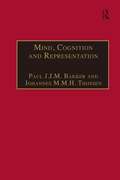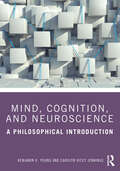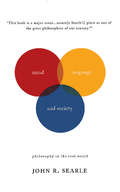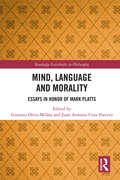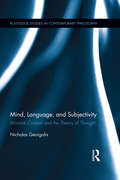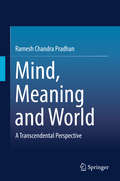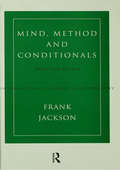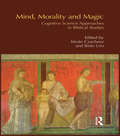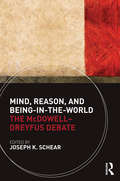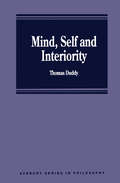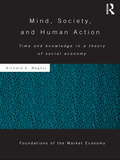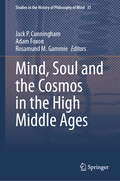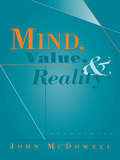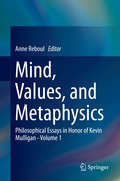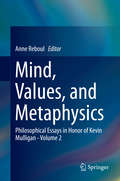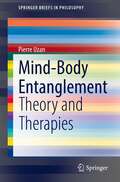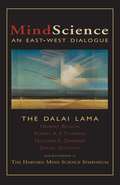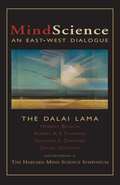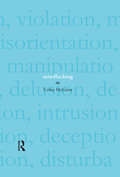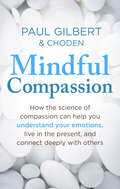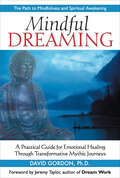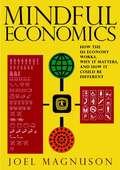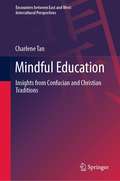- Table View
- List View
Mind, Cognition and Representation: The Tradition of Commentaries on Aristotle’s De anima (Ashgate Studies in Medieval Philosophy)
by Paul J.J.M. BakkerHow can beliefs, which are immaterial, be about things? How can the body be the seat of thought? This book traces the historical roots of the cognitive sciences and examines pre-modern conceptualizations of the mind as presented and discussed in the tradition of commentaries on Aristotle's De anima from 1200 until 1650. It explores medieval and Renaissance views on questions which nowadays would be classified under the philosophy of mind, that is, questions regarding the identity and nature of the mind and its cognitive relation to the material world. In exploring the development of scholastic ideas, concepts, arguments, and theories in the tradition of commentaries on De anima, and their relation to modern philosophy, this book dissolves the traditional periodization into Middle Ages, Renaissance and early modern times. By placing key issues in their philosophico-historical context, not only is due attention paid to Aristotle's own views, but also to those of hitherto little-studied medieval and Renaissance commentators.
Mind, Cognition, and Neuroscience: A Philosophical Introduction
by Carolyn Dicey Jennings Benjamin D. YoungThis carefully designed, multi-authored textbook covers a broad range of theoretical issues in cognitive science, psychology, and neuroscience. With accessible language, a uniform structure, and many pedagogical features, Mind, Cognition, and Neuroscience: A Philosophical Introdution is the best high-level overview of this area for an interdisciplinary readership of students. Written specifically for this volume by experts in their fields who are also experienced teachers, the book’s thirty chapters are organized into the following parts: I. Background KnowledgeII. Classical DebatesIII. ConsciousnessIV. Crossing Boundaries Each chapter starts with relevant key words and definitions and a chapter overview, then presents historical coverage of the topic, explains and analyzes contemporary debates, and ends with a sketch of cutting edge research. A list of suggested readings and helpful discussion topics conclude each chapter. This uniform, student-friendly design makes it possible to teach a cohort of both philosophy and interdisciplinary students without assuming prior understanding of philosophical concepts, cognitive science, or neuroscience. Key Features: Synthesizes the now decades-long explosion of scientifically informed philosophical research in the study of mind. Expands on the offerings of other textbooks by including chapters on language, concepts and non-conceptual content, and animal cognition. Offers the same structure in each chapter, moving the reader through an overview, historical coverage, contemporary debates, and finally cutting-edge research. Packed with pedagogical features, like defined Key Terms, Suggested Readings, and Discussion Questions for each chapter, as well as a General Glossary. Provides readers with clear, chapter-long introductions to Cognitive Neuroscience, Molecular and Cellular Cognition, Experimental Methods in Cognitive Neuroscience, Philosophy of Mind, Philosophy of Science, Metaphysical Issues, and Epistemic Issues.
Mind, Language And Society: Philosophy in the Real World
by John R. SearleDisillusionment with psychology is leading more and more people to formal philosophy for clues about how to think about life. But most of us who try to grapple with concepts such as reality, truth, common sense, consciousness, and society lack the rigorous training to discuss them with any confidence. John Searle brings these notions down from their abstract heights to the terra firma of real-world understanding, so that those with no knowledge of philosophy can understand how these principles play out in our everyday lives. The author stresses that there is a real world out there to deal with, and condemns the belief that the reality of our world is dependent on our perception of it.
Mind, Language and Morality: Essays in Honor of Mark Platts (Routledge Festschrifts in Philosophy)
by Gustavo Ortiz-Millán Juan Antonio Cruz ParceroMark Platts is responsible for the first systematic presentation of truth-conditional semantics and for turning a generation of philosophers on to the Davidsonian program. He is also a pioneer in discussions of moral realism, and has made important contributions to bioethics, the philosophy of human rights and moral responsibility. This book is a tribute to Platts’s pioneering work in these areas, featuring contributions from number of leading scholars of his work from the US, UK and Mexico. It features replies to the individual essays from Platts, as well as a concluding chapter reflecting on his philosophical career from Oxford to Mexico City. Mind, Language and Morality will be of interest to philosophers across a wide range of areas, including ethics, moral psychology, philosophy of law, and philosophy of language.
Mind, Language and Subjectivity: Minimal Content and the Theory of Thought (Routledge Studies in Contemporary Philosophy)
by Nicholas GeorgalisIn this monograph Nicholas Georgalis further develops his important work on minimal content, recasting and providing novel solutions to several of the fundamental problems faced by philosophers of language. His theory defends and explicates the importance of ‘thought-tokens’ and minimal content and their many-to-one relation to linguistic meaning, challenging both ‘externalist’ accounts of thought and the solutions to philosophical problems of language they inspire. The concepts of idiolect, use, and statement made are critically discussed, and a classification of kinds of utterances is developed to facilitate the latter. This is an important text for those interested in current theories and debates on philosophy of mind, philosophy of language, and their points of intersection.
Mind, Language, and Metaphilosophy
by Richard Rorty Stephen Leach Richard Rorty James Tartaglia James TartagliaThis volume presents a selection of the philosophical essays which Richard Rorty wrote during the first decade of his career, and complements four previous volumes of his papers published by Cambridge University Press. In this long neglected body of work, which many leading philosophers still consider to be his best, Rorty develops his views on the nature and scope of philosophy in a manner which supplements and elucidates his definitive statement on these matters in Philosophy and the Mirror of Nature. He also develops his groundbreaking version of eliminative materialism, a label first coined to describe his position, and sets out original views on various central topics in the philosophy of language, concerning private language, indeterminacy, and verificationalism. A substantial introduction examines Rorty's philosophical development from 1961 to 1972. The volume completes our understanding of Rorty's intellectual trajectory and offers lucid statements of positions which retain their relevance to current debates.
Mind, Meaning and World: A Transcendental Perspective
by Ramesh Chandra PradhanThe present book intends to approach the problem of mind, meaning and consciousness from a non-naturalist or transcendental point of view. The naturalization of consciousness has reached a dead-end. There can be no proper solution to the problem of mind within the naturalist framework. This work intends to reverse this trend and bring back the long neglected transcendental theory laid down by Kant and Husserl in the West and Vedanta and Buddhism in India. The novelty of this approach lies in how we can make an autonomous space for mind and meaning without denying its connection with the world. The transcendental theory does not disown the embodied nature of consciousness, but goes beyond the body in search of higher meanings and values. The scope of this work extends from mind and consciousness to the world and brings the world into the space of mind and meaning with a hope to enchant the world. The world needs to be retrieved from the stranglehold of scientism and naturalism. This book will dispel the illusion about naturalism which has gripped the minds of our generation. The researchers interested in the philosophy of mind and consciousness can benefit from this work.
Mind, Method and Conditionals: Selected Papers (International Library of Philosophy)
by Frank JacksonFirst Published in 2004. Routledge is an imprint of Taylor & Francis, an informa company.
Mind, Morality and Magic: Cognitive Science Approaches in Biblical Studies
by Risto Uro Istvan CzacheszThe cognitive science of religion that has emerged over the last twenty years is a multidisciplinary field that often challenges established theories in anthropology and comparative religion. This new approach raises many questions for biblical studies as well. What are the cross-cultural cognitive mechanisms which explain the transmission of biblical texts? How did the local and particular cultural traditions of ancient Israel and early Christianity develop? What does the embodied and socially embedded nature of the human mind imply for the exegesis of biblical texts? "Mind, Morality and Magic" draws on a range of approaches to the study of the human mind - including memory studies, computer modeling, cognitive theories of ritual, social cognition, evolutionary psychology, biology of emotions, and research on religious experience. The volume explores how cognitive approaches to religion can shed light on classical concerns in biblical scholarship - such as the transmission of traditions, ritual and magic, and ethics - as well as uncover new questions and offer new methodologies.
Mind, Reason, and Being-in-the-World: The McDowell-Dreyfus Debate
by Joseph K. SchearJohn McDowell and Hubert L. Dreyfus are philosophers of world renown, whose work has decisively shaped the fields of analytic philosophy and phenomenology respectively. Mind, Reason, and Being-in-the-World: The McDowell-Dreyfus Debate opens with their debate over one of the most important and controversial subjects of philosophy: is human experience pervaded by conceptual rationality, or does experience mark the limits of reason? Is all intelligibility rational, or is there a form of intelligibility at work in our skilful bodily rapport with the world that eludes our intellectual capacities? McDowell and Dreyfus provide a fascinating insight into some fundamental differences between analytic philosophy and phenomenology, as well as areas where they may have something in common. Fifteen specially commissioned chapters by distinguished international contributors enrich the debate inaugurated by McDowell and Dreyfus, taking it in a number of different and important directions. Fundamental philosophical problems discussed include: the embodied mind, subjectivity and self-consciousness, intentionality, rationality, practical skills, human agency, and the history of philosophy from Kant to Hegel to Heidegger to Merleau-Ponty. With the addition of these outstanding contributions, Mind, Reason, and Being-in-the-World is essential reading for students and scholars of analytic philosophy and phenomenology.
Mind, Self and Interiority (Avebury Series in Philosophy)
by Thomas DuddyContemporary philosophers of mind often raise serious questions around the concepts of self, subjectivity, and ’the inner life’ on the grounds that such concepts have their origin in a discredited Cartesian metaphysics. The contention of this book is that the rejection of ’interiority’ and related concepts has been based on a time-honoured misreading of Descartes. In the course of exposing the misconceived anti-Cartesianism of a wide range of thinkers from Wittgenstein and Ryle to Dennett and Foucault, an attempt is made to clear a space for a new post-Cartesian conception of subjectivity - a conception of subjectivity which is consistent with at least some versions of materialism. The aim of this book is not to defend Cartesian dualism but to reclaim important concepts that have been anathematized by having been mistakenly associated with it.
Mind, Society, and Human Action: Time and Knowledge in a Theory of Social-Economy (Routledge Foundations Of The Market Economy Ser.)
by Richard E. WagnerEconomics originated as a branch of the humane studies that was concerned with trying to understand how some societies flourish while others stagnate, and also how once-flourishing societies could come to stagnate. Over the major part of the 20th century, however, economists mostly turned away from these humane and societal concerns by importing mechanistic ideas from 19th century physics. This book seeks to show how that original humane and social focus can be renewed. The many particular topics the book examines can be traced to two central ideas. Firstly, that economic theory, like physics, requires two distinct theoretical frameworks. One treats qualities that are invariant across time and place; this is the domain of equilibrium theory. The other treats the internal generation of change in societies through entrepreneurial action that continually transforms the ecology of enterprises that constitutes a society. Secondly, economic theory is treated as a genuine social science and not a science of rationality writ large. The book also explores ways in which life in society is understood differently once economics is treated as a social science. The book is much of the hyper-formality that comprises economic theory these days fails to make reasonable contact with reality. It will be of interest to sociologists, political scientists, and researchers in law, public policy, Austrian economics, evolutionary economics, institutional economics and political economy.
Mind, Soul and the Cosmos in the High Middle Ages (Studies in the History of Philosophy of Mind #31)
by Jack P. Cunningham Adam Foxon Rosamund M. GammieThis is a unique volume in which a critical introduction and multiple chapters offer a wide-ranging discussion of medieval conceptions of the nature of humankind, its relationship with the universe, and the processes of thinking by which both are conceptualized. Concentrating on the centuries spanning the High Middle Ages, chapters include in-depth analyses of such ideas as the habit as the ultimate dwelling place of the soul, the Soul of the Universe and its relation to humanity, and the Agent Intellect’s part in the functions of the mind regarding abstraction and intuition. This book explores how metaphysical Intelligences interact with our movements, how the desires of our minds affect the acquisition of knowledge, as well as asking how and why analysis of the makeup of animal souls took place. The High Middle Ages was a crucially important epoch in the history of intellectual endeavor. This volume appeals to students and researchers; it discusses and evaluates the contributions on the subjects of mind, soul, and the cosmos of some of the finest Christian, Jewish, and Moslem intellects in the twelfth and thirteenth centuries. Theologians, philosophers, and cosmologists include Aquinas, Grosseteste, Avicenna, Gersonides, Buridan, the School of Chartres, as well as many others. The overarching theme of this collection of essays is that vitally new conceptions of what it meant to be a rational Human, the purpose of thought in relation to the journey of the soul, and the metaphysical character of our universe contributed enormously to the paradigm-shifting nature of this age.
Mind, Value, and Reality
by John McDowellThis volume collects some of John McDowell's influential papers, written at various times over the last two decades. One group of essays deals mainly with issues in the interpretation of the ethical writings of Aristotle and Plato. A second group of papers contains more direct treatments of questions in moral philosophy that arise naturally out of reflection on the Greek tradition. Some of the essays in the second group exploit Wittgensteinian ideas about reason in action, and they open into the third group of papers, which contains readings of central elements in Wittgenstein's difficult later work. A fourth group deals with issues in the philosophy of mind and with questions about personal identity and the special character of first-personal thought and speech.
Mind, Values, and Metaphysics
by Anne ReboulThis book addresses five main topics of metaphysics in its first section: formal objects and truth-makers; tropes; properties and predicates; varieties of relations; and the notion of explanation in metaphysics. The second part of this volume focuses on the history of philosophy with an emphasis on Austrian philosophy: the ideas of Bolzano, Wittgenstein, Locke and Bergson, amongst others, are explored in the papers presented here. This is the first volume in a two-volume set that originates from papers presented to Professor Kevin Mulligan, covering the subjects that he contributed to during his career including ontology, mind and value, history and philosophy of mind and philosophy of language. This volume contains thirty two chapters, written by researchers from across Europe, North America and North Africa. These papers cover topics in metaphysics ranging from Lehrer and Tolliver's discussion of truth and tropes, to Johansson's defence of the distinction between thick and thin relations and Persson and Sahlin's presentation of the difficulties inherent in applying the concept of explanation in metaphysics. Papers on the history of philosophy include a look at Bolzano's formative years and his conception of mathematics. De Libera examines Brentano's adverbial theory of judgment and Fisette traces the history of the Philosophical Society of the University of Vienna in the late 19th and early 20th century. Marion contests the trendy pragmatist accounts that lump Wittgenstein and Heidegger together and there are analyses of Locke and Bergson's work, amongst the many papers presented here. This volume contains three chapters in French and one in Spanish. The second volume of this set looks at ethics, values and emotions, epistemology, perception and consciousness, as well as philosophy of mind and philosophy of language.
Mind, Values, and Metaphysics
by Anne ReboulThere are three themed parts to this book: values, ethics and emotions in the first part, epistemology, perception and consciousness in the second part and philosophy of mind and philosophy of language in the third part. Papers in this volume provide links between emotions and values and explore dependency between language, meanings and concepts and topics such as the liar's paradox, reference and metaphor are examined. This book is the second of a two-volume set that originates in papers presented to Professor Kevin Mulligan, covering the subjects that he contributed to during his career. This volume opens with a paper by Moya, who proposes that there is an asymmetrical relation between the possibility of choice and moral responsibility. The first part of this volume ends with a description of foolishness as insensitivity to the values of knowledge, by Engel. Marconi's article makes three negative claims about relative truth and Sundholm notes shortcomings of the English language for epistemology, amongst other papers. This section ends with a discussion of the term 'subjective character' by Nida-Rümelin, who finds it misleading. The third part of this volume contains papers exploring topics such as the mind-body problem, whether theory of mind is based on simulation or theory and Künne shows that the most common analyses of the so-called 'Liar' paradox are wanting. At the end of this section, Rizzi introduces syntactic cartography and illustrates its use in scope-discourse semantics. This second volume contains twenty nine chapters, written by both high profile and upcoming researchers from across Europe, North America and North Africa. The first volume of this set has two main themes: metaphysics, especially truth-making and the notion of explanation and the second theme is the history of philosophy with an emphasis on Austrian philosophy.
Mind-Body Entanglement: Theory and Therapies (SpringerBriefs in Philosophy)
by Pierre UzanThis book suggests a radical departure in approaching the mind-body problem. Instead of trying to causally relate subjective experience to the functioning of the body, it begins with the notion of the psychosomatic unity of the individual and looks for its conditions of possibility. This text shows that what makes this unity possible is the generalized entanglement relation that connects a person's subjective experience with its body functioning in a specific way.In addition to providing a significant contribution to the long-standing philosophical debate about the nature of the mind-body connection, this change of perspective based on the concept of generalized entanglement allows for exploring a holistic approach to health. It can for example explain the existence of body memory and leads to a better understanding of the genesis and evolution of internal diseases, allowing for the development of mind-body therapies. This volume also provides new insights into mental disorders and sets the theoretical basis of self-healing methods appealing to students, researchers and professionals in the fields.
MindScience
by Daniel Goleman Herbert Benson Robert Thurman His Holiness the Dalai Lama Howard GardnerWhat is the subtle relationship between mind and body? What can today's scientists learn about this relationship from masters of Buddhist thought? Is it possible that by combining Western and Eastern approaches, we can reach a new understanding of the nature of the mind, the human potential for growth, the possibilities for mental and physical health? MindScience explores these and other questions as it documents the beginning of a historic dialogue between modern science and Buddhism. The Harvard Mind Science Symposium brought together the Dalai Lama and authorities from the fields of psychiatry, psychology, neuroscience, and education. Here, they examine myriad questions concerning the nature of the mind and its relationship to the body.
MindScience: An East-West Dialogue
by Dalai Lama Daniel Goleman Robert ThurmanExploration of mind/body concepts based on a Harvard Medical School symposium.
Mindfucking: A Critique of Mental Manipulation
by Colin McGinnBeing surrounded by bullshit is one thing. Having your mind fucked is quite another. The former is irritating, but the latter is violating and intrusive (unless you give your consent). If someone manipulates your thoughts and emotions, messing with your head, you naturally feel resentment: he or she has distorted your perceptions, disturbed your feelings, maybe even usurped your self. Mindfucking is a prevalent aspect of contemporary culture and the agent can range from an individual to a whole state, from personal mind games to wholesale propaganda.In "Mindfucking", Colin McGinn investigates and clarifies this phenomenon, taking in the ancient Greeks, Shakespeare and modern techniques of thought control. McGinn assembles the conceptual components of this most complex of concepts - trust, deception, emotion, manipulation, false belief, vulnerability - and explores its very nature. Is philosophy, as a discipline, a type of mindfuck, asks McGinn? Is romantic love a species of mindfuck? The essence is psychological upheaval or disorientation, often abetted by the weaknesses of the victim. Jealousy, insecurity and prejudice can aid the mindfuck. Delusion is the general result, sometimes insanity. How mindfucked are you? It's hard to say from the inside, but being aware of the phenomenon offers at least some protection.
Mindful Compassion: Using The Power Of Mindfulness And Compassion To Transform Our Lives
by Choden Prof Paul GilbertBased on the latest work from Professor Paul Gilbert OBE, bestselling author of The Compassionate Mind, and Buddhist expert Choden. Professor Gilbert has spent the past twenty years developing a new therapy called Compassion-Focused Therapy (CFT) which has an gained international following. In recent years, mindfulness is being used increasingly to treat common mental health problems such as depression, stress and stress-related insomnia. In this ground-breaking new book, Professor Gilbert, along with his co-author Choden, combines the best of Compassion-Focused Therapy with the most effective mindfulness techniques. The result is an extremely effective approach to overcoming everyday emotional and psychological problems and improving one's sense of wellbeing.
Mindful Compassion: Using The Power Of Mindfulness And Compassion To Transform Our Lives
by Choden Prof Paul GilbertBased on the latest work from Professor Paul Gilbert OBE, bestselling author of The Compassionate Mind, and Buddhist expert Choden. Professor Gilbert has spent the past twenty years developing a new therapy called Compassion-Focused Therapy (CFT) which has an gained international following. In recent years, mindfulness is being used increasingly to treat common mental health problems such as depression, stress and stress-related insomnia. In this ground-breaking new book, Professor Gilbert, along with his co-author Choden, combines the best of Compassion-Focused Therapy with the most effective mindfulness techniques. The result is an extremely effective approach to overcoming everyday emotional and psychological problems and improving one's sense of wellbeing.
Mindful Dreaming: A Practical Guide for Emotional Healing Through Transformative Mythic Journeys
by PhD David Gordon“To merge a deep understanding of dream work with the mindfulness techniques of Buddhist practice brings a new light to bear on each of these subjects.” —Jean Campbell, president, International Association for the Study of DreamsIn Mindful Dreaming, psychologist David Gordon shows how every dream corresponds to one of the four universal stages of healing and growth that Joseph Campbell called the Mythic “search for bliss.” Dreams teach us to recognize the spiritual lessons of each phase of the Journey and urge us to learn ten perennial steps to mindfulness taught by spiritual traditions throughout the millennia. A breakthrough in the field of mindfulness practice and dreamwork, Mindful Dreaming teaches you the simple language of dreams and how they promote mindfulness in our everyday lives.Relaxing our grip on control, our dreams open us to guidance from the Source. Helping us see through the illusion of permanence, they teach us to release attachments and grieve the limitations and losses that life imposes. Mindful of our destructive rush to judgment, our dreams move us to embrace compassion for our own suffering—not just that of others. Finally, dreams teach us mindfulness of our impatience so that we may live more consciously and awake in the present moment.Relying on thought-provoking exercises and abundant examples from the life-changing dreams of the author, his clients and friends, Mindful Dreaming demonstrates how dreams provide a non-judgmental and compassionate mirror that reflect our ongoing progress on the Journey to mindfulness. Mindful dreaming leads us to overcome the emotional blocks that keep us feeling stuck and conflicted in love relationships, frustrated in work, or stagnating in our creative goals.
Mindful Economics: How the U.S. Economy Works, Why it Matters, and How it Could Be Different
by Joel MagnusonAre the huge profits garnered by corporations each year a case of a few bad apples in the business world taking advantage of unmonitored dealings? Is this consolidation of wealth made at the expense of the overall economy and the wellbeing of the average citizen? Will the planet be saved by developing more "green businesses" and "green collar" jobs? Joel Magnuson delivers a powerful response to the current misconceptions about the US economy in his brilliantly accessible Mindful Economics. The troubles we face are not the result of a good system gone awry, but rather a system that is built to do exactly what it is doing: corporations are designed to reap profits for its shareholders, at any cost. The greater welfare of society, or of the environment, will never be as important as financial gain. Magnuson shows us the relationship between the current wars abroad; rising oil prices; the recession; ballooning incomes of top CEOs; the mortgage crisis; and the health care, insurance, and auto industries, and he teaches us that the best way to understand the US economy is to think like an economist. With stunning clarity, Magnuson shows the interconnectedness of the local with the global, and offers real alternatives to this capitalist model.
Mindful Education: Insights from Confucian and Christian Traditions (Encounters between East and West)
by Charlene TanThis book provides original ideas and practical recommendations for educators in a post-pandemic world. We live in a world that has been upended by the COVID-19 pandemic. Students around the globe have been besieged by disruptions that threaten not only their academic learning but also their mental, emotional, and interpersonal well-being. In the midst of pressing and mounting challenges, how can schools ensure the total wellness of all their students? Beyond reactive, piecemeal, and short-term measures, how can schools enact mindful education that pays attention to wholeness in every student? Extending the current research on well-being and mindfulness, this book draws insights from Confucian and Christian traditions. These two traditions have been selected as they are widely seen to represent, and have impacted, Eastern and Western civilisations respectively for millennia. Informed and inspired by Confucian and Christian perspectives, this book proposes that mindfulness is an orientation towards wholeness, where one experiences he (harmony) and shalom (peace). Mindful education is realised through: A school community of ren (humanity) and agape (love); A transforming curriculum that centres on dao (way) and imago dei (god’s image); Empathic teachers who are motivated by shu (putting oneself in the other’s place) and the Golden Rule (do to others as you would have them do to you); and Self-directed learners who develop themselves through xiuji (self-cultivation) and spiritual disciplines. Applying ancient wisdom to contemporary settings, this book on promoting student well-being through mindful education is a useful resource for policymakers, educators, researchers, and general readers.
